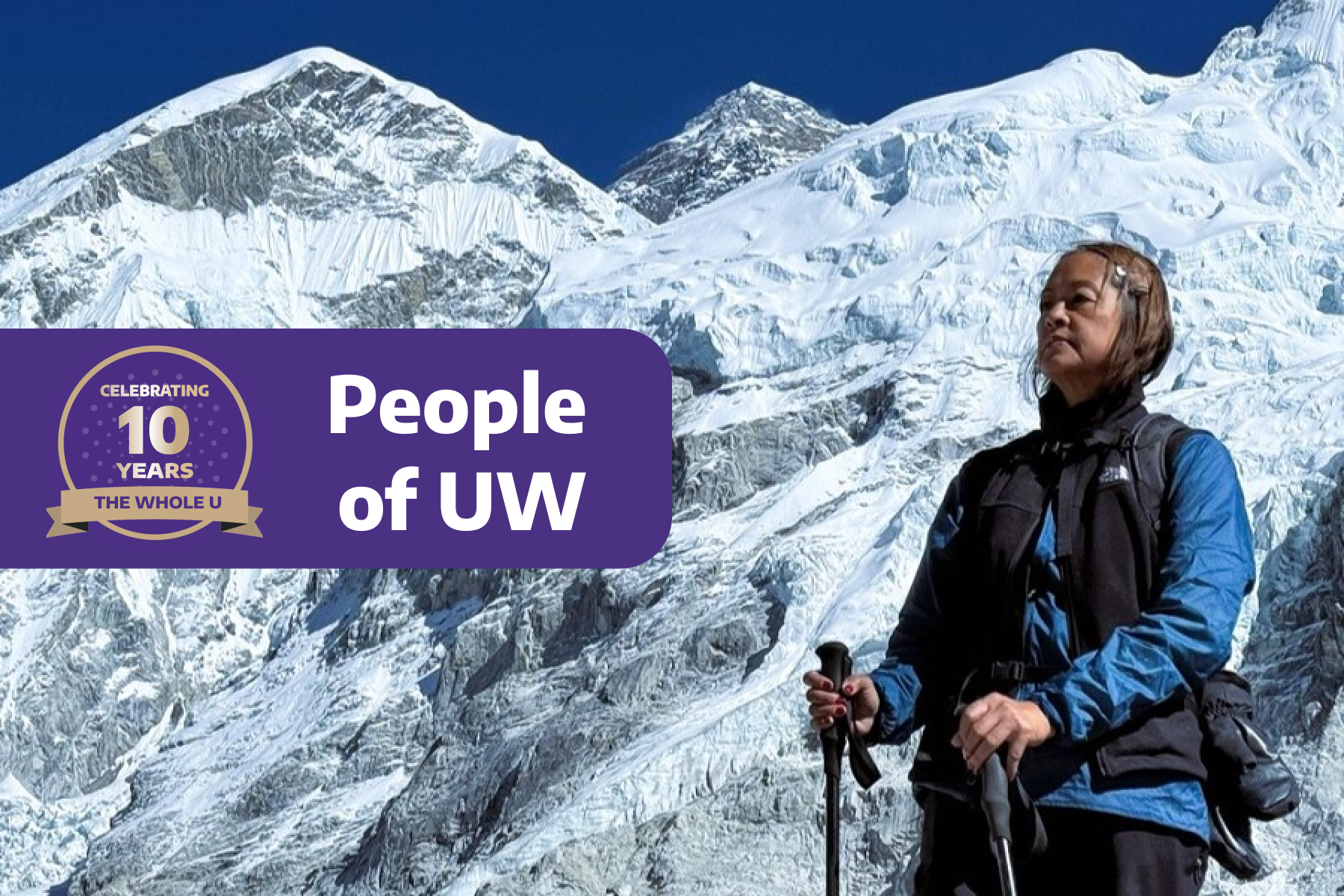
Maria Lamarca Anderson embarks on a solo, soulful journey of discovery in the high Himalayas
“Tell me, what is it you plan to do with your one wild and precious life?”
This question, posed by the poet Mary Oliver, was designed to inspire a bit of introspection.
But when Maria Lamarca Anderson encountered it — on a milestone birthday at her physical and emotional limit in the thin air of the high Himalayas — Oliver’s existential challenge hit her straight in the soul.
She had left home alone more than a week earlier to attempt the epic trek to Mount Everest Base Camp, at the craggy lap of Sagarmatha, the “Goddess of the Sky,” that has borne witness to incalculable human triumph and tragedy.
Lamarca Anderson was going for more modest ends from this long-imagined adventure. Principal among them, a much-deserved pause from an overtaxed life of service — directing communications at UW Bothell while providing extraordinary care to family, friends and strangers (who usually become friends).
Many of those friends had submitted a favorite intention or reflection to help her along this journey of a lifetime. She carried their words, written on ribbons of paper, in an envelope. Each morning, she would pick one at random to consider that day.
The message drawn on this particular morning sent Lamarca Anderson’s mind to racing. What had she made of her one wild and precious life? What would she do with the rest of it?
Even more than her life and legacy, though, Lamarca Anderson wondered what she was doing here. On this rugged, unrelenting trail leading through this brutal, beautiful landscape. A middle-aged mortal walking among superhuman athletes and super-seasoned trekkers.
“Who am I,” she thought, “to do something like this?”
An American dream
Maria Lamarca Anderson was born in the Philippines and moved with her family to the United States in the early 1970s, settling in Everett, Washington.
Hers is a classic immigrant story of hard-working parents seeking a better life for their children — all six of them — in an unfamiliar land. Her mother, Lourdes, was a piano teacher who took work as a housekeeper at a hospital and instilled in Maria and her siblings a love of music and the arts. Her father, Rafael, forged a career in engineering with the City of Everett, the U.S. Forest Service and the National Oceanic and Atmospheric Administration after serving in the U.S. Army during the Second World War (for which he was awarded the Congressional Gold Medal in 2017, just weeks after his passing at age 95). He handed down a passion for travel and adventure.
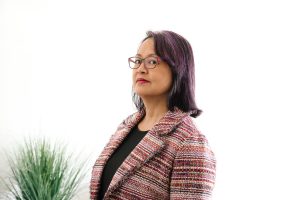 From this foundation, Maria grew up smart and ambitious, and blazed her own career path in marketing and media. She started out at the Everett Mall before working in technology (Vision Compass, LapLink), social services (Foundation for Early Learning, Youth Eastside Services, Northwest Harvest), the arts (Seattle Choruses) and television (KING and KIRO).
From this foundation, Maria grew up smart and ambitious, and blazed her own career path in marketing and media. She started out at the Everett Mall before working in technology (Vision Compass, LapLink), social services (Foundation for Early Learning, Youth Eastside Services, Northwest Harvest), the arts (Seattle Choruses) and television (KING and KIRO).
She won an Emmy Award while leading community relations at KIRO and has worked to create greater diversity, equity and inclusion in the media through her long service on the board of the National Academy of Television Arts & Sciences Northwest Chapter.
Since 2012, Lamarca Anderson has applied her skills to higher education, first at Seattle Colleges and now at UW Bothell.
Taking care
Alongside her career, Lamarca Anderson has devoted herself to service, another trait inherited from Lourdes and Rafael. “My parents raised us right,” she says. “We did not have means. But they always found a way to help people. They modeled kindness and compassion.”
Her own compassion manifested in volunteer engagements starting as far back as high school and continuing throughout her career. “I commit to three opportunities each year,” she says.
In the early 1990s, after a dear friend died of non-Hodgkin’s Lymphoma, “I needed to do something in his honor,” Lamarca Anderson says. “So, I committed to serving for a year with Chicken Soup Brigade (now Lifelong), because he had received services from them.”
She stayed on for decades, delivering meals and groceries to the agency’s home-bound clients every week.
When the COVID-19 pandemic struck, Lamarca Anderson turned her experience into a mission to serve homeless people. She partnered with a collective of kind-hearted Seattle restaurants, led by Musang, to deliver fresh-cooked meals four nights a week to those in need all over the city.
She continues to make regular deliveries around Seattle, securing donations of food, clothing and other necessities from an expanding network of benefactors. “When it’s winter, I put out a call for coats, gloves and hats, and family and friends just give them to me,” she says. “Their generosity blows me away.”
While managing this outreach to the unsheltered, Lamarca Anderson has also served as a primary caregiver to several people in her life, including her former husband, Michael Anderson, who has lived with Alzheimer’s disease for 10 years. It is a role without boundaries.
For these extraordinary extracurricular activities, Anderson received a Community Engagement Award from UW Bothell and a Together We Will Award from the UW in 2021.
“Maria goes out of her way to help others, exemplifying the UW’s commitment to public service,” noted the UW award committee. “Her empathy, kindness and humanity shine through, and her colleagues consider her an inspiration for the way she creates positive impact in her community.”
A passion for adventure, reignited
All this service took a toll on Lamarca Anderson. The unrelenting demands of work and care giving had left her with vanishingly little time for herself. She had once been an enthusiastic traveler (“I’m very much my father’s daughter,” she notes) and a devout hiker who described the back country as her “church.”
In the past 15 years, though, she had barely laced a boot.
As her milestone birthday approached, she decided it was time to plan something for herself. Something more adventurous than a fruity cocktail on a tropical beach.
Her friend Seth Wolpin, a former faculty member at the UW School of Nursing who had co-founded Himalayan Adventure Labs, recommended she go on a trek. She had been fascinated by the allure of Mount Everest ever since reading Jon Krakauer’s “Into Thin Air” in the 1990s. “I am drawn to the big and grand, experiences that are unique,” Lamarca Anderson admits. “That’s part of who I am.”
She was sold. She hired a guide and charted a route, through her friend’s company, and she booked an October flight to Nepal. And then, just six months ahead of touch down in Kathmandu, she began training. From scratch.
“I don’t think I had walked more than a few blocks in 10 years,” she says
Under the guidance of a coach, Courtenay Schurman, Lamarca Anderson gradually increased her mileage, did some targeted strength training and took on increasingly challenging hikes. For inspiration and orientation, she read up on the region, the mountains and the trail.
In September, Coach Court declared her ready. Her community pitched in to cover work and personal commitments for her extended leave of absence. And off she flew, into the unknown. “Everyone knew how much this trip meant to me,” Lamarca Anderson says. “It was the first time I’ve ever really gotten away from my work and disappeared while life goes on.”
An intimate epic
Her Himalayan adventure was about as far from normal life as she could imagine. It took several chaotic days and every kind of transportation imaginable just to get from Kathmandu to the trail, a life lesson in patience that minted “Newly Chill Maria,” who learned to cede control and go with the flow.
Though hers was a solo trek, she traveled with her artistic guide, Srijan Ayer, and a protective porter named Arjun who found her 20-pound pack, compared to the 200-pound loads he usually carried, a piece of cake.
As the kilometers ticked on slowly, Lamarca Anderson developed an affinity for the people of Nepal and a deep admiration for their “strength, resilience, kindness and contentment,” she says. “While trekkers and climbers would leave so much waste along the trail, in the villages, nothing is wasted.”
She met a few of those trekkers, too, but mostly kept to herself. And not necessarily by choice. “I couldn’t talk,” she explains. “It was so hard to breathe.”
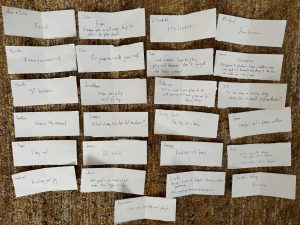 Life on the trail was boiled down to the essentials. She mostly walked. And she thought. About her place in this vast world around her and the intimate world that awaited her return. About her fears and hopes and dreams. Each morning’s intention set the theme, and she went with it.
Life on the trail was boiled down to the essentials. She mostly walked. And she thought. About her place in this vast world around her and the intimate world that awaited her return. About her fears and hopes and dreams. Each morning’s intention set the theme, and she went with it.
At nightly tea house stays, she wrote and rested uncomfortably, the temperatures dropping the farther she climbed.
Lamarca Anderson began doubting she could make it to her destination. But then, on her birthday, she caught her first glimpse of the great mountain, Sagarmatha, which had been shrouded in clouds for days. The sight was breathtaking. Invigorating. And she found the energy to push on.
A few weary days later, she arrived at Mount Everest Base Camp, more than 17,500 feet higher than sea level.
It’s about the journey
Lamarca Anderson felt a quiet swell of pride in her accomplishment. She learned volumes about herself along the trail, including one revelation in particular: “I’m stronger than I think I am.”
But most of all, she felt a profound sense of gratitude. For her generous community of friends and family and co-workers who allowed her to make this journey. For the privilege of being able to take such a trip. For the support of her companions along the trail. And for her great good fortune that her body didn’t let her down. “I experienced no illness, no injury, no diarrhea, no altitude sickness. Not even a headache,” she marvels. “When does everything come together like that?”
 And for a person whose hectic schedule leaves precious little time for contemplation, Lamarca Anderson came to treasure this singular opportunity to detach — from the world and its woes and the busyness of her life — and reflect.
And for a person whose hectic schedule leaves precious little time for contemplation, Lamarca Anderson came to treasure this singular opportunity to detach — from the world and its woes and the busyness of her life — and reflect.
She learned that she needs to make more time for adventures, which are essential to her being. But she also continues to ponder Mary Oliver’s piercing question from that morning in the Himalayas. What is she going to do with her one wild and precious life?
“It almost feels selfish to think about legacy,” she says. “But when you have a big birthday, it’s hard not to think about it.”
Alongside her work at UW Bothell, she is currently mentoring senior Aditi Nambiar, a 2024 Newman Civic Fellow, and working to grow the Michael Anderson and Maria Lamarca Anderson Connected Learning Fund, an endowment she created to carry on her former husband’s legacy.
Beyond her volunteer outreach, she may try to address the homelessness crisis at a more systemic level. Or work to expand access to the outdoors for marginalized. “I’m still trying to figure it out,” she admits.
What Lamarca Anderson is too humble — and maybe too busy — to see, is that she has been building an incredible legacy all along in the extraordinary care she gives and the humanity and goodwill she brings to a weary world.
“I think we all do what we can in whatever space we are in life,” she says. “Right now, this is what I can do.”
Photography courtesy of Maria Lamarca Anderson. Studio portrait by Kristian Gorman.
Experience Sagarmatha
Experience Maria Lamarca Anderson’s revelatory October 2023 trek to Mount Everest Base Camp through her virtual slideshow, produced by The Whole U.
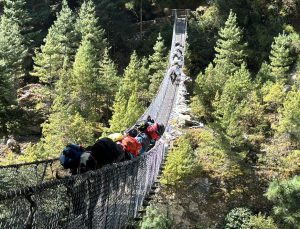
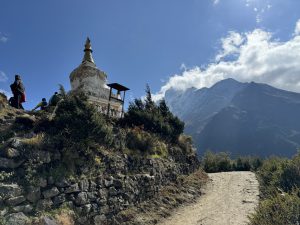
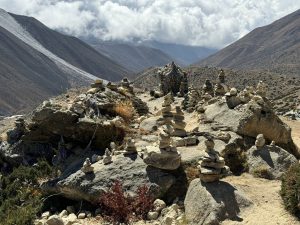
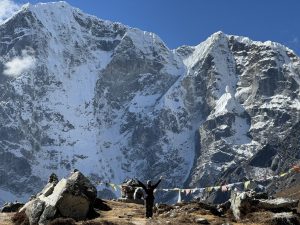
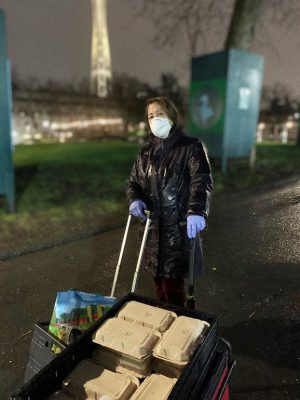
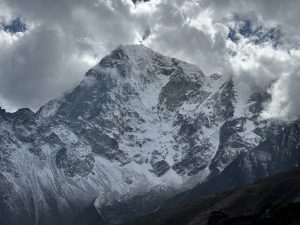
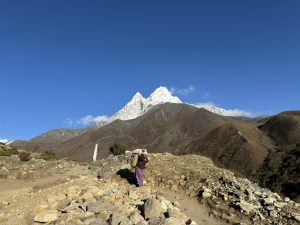
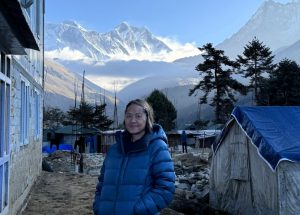
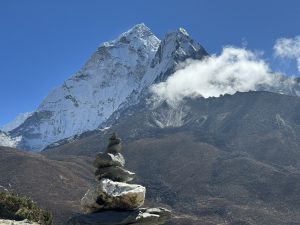
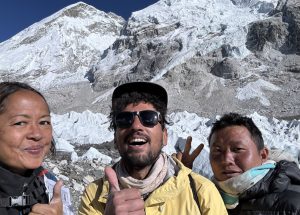
One Thought on “Maria Lamarca Anderson embarks on a solo, soulful journey of discovery in the high Himalayas”
On September 24, 2024 at 5:48 AM, Courtenay Schurman said:
Fabulous story about a remarkable woman. I know: I coached her.